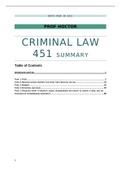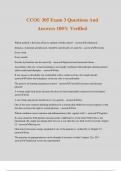NOTES MADE IN 2021
PROF HOCTOR
CRIMINAL LAW
451 SUMMARY
Table of Contents
PROFESSOR HOCTOR........................................................................................................................2
TOPIC 1: THEFT..................................................................................................................................2
TOPIC 2: RECEIVING STOLEN PROPERTY/STATUTORY THEFT/REMOVAL FOR USE...............................................33
TOPIC 3: ROBBERY............................................................................................................................56
TOPIC 4: EXTORTION AND FRAUD.........................................................................................................69
TOPIC 5: MALICIOUS INJURY TO PROPERTY, ARSON, HOUSEBREAKING WITH INTENT TO COMMIT A CRIME, AND THE
POSSESSION OF HOUSEBREAKING IMPLEMENTS.........................................................................................88
1
, PROFESSOR HOCTOR
TOPIC 1: THEFT
Introduction:
Constitutional context:
o Constitutional right to property
o Fundamental civil right
o It creates the basis for wealth, security, social welfare and prosperity
o Thus, this right is protected by criminal offences.
Consideration of the fact that one’s “home” should be a safe space in which
a person is able to have fun, relax, and unwind.
If the right to property is not properly protected, then the whole community
bears the burden
o We are taxpayers and the cost of property crime is passed on to the
consumer
Thus, it is to the benefit of everyone in the community to enforce the right
to property through criminal sanctions.
The Right to property is a debated matter in SA
o Mainly due to social inequality and the inherited stratification of
groups and status from the Apartheid era.
o Not everyone can fully appreciate the right to property due to our
history.
Despite this, everyone has the right to have their property
protected.
Concepts:
Theft: taking someone else’s property
Robbery: taking someone else’s property by means of force
Extortion: obtaining property by other means of pressure
Fraud: theft by false pretences (combination of theft and fraud)
Receiving stolen property
Housebreaking with intent to commit a crime: usually intended crime is theft
2
, Arson: intentional damage to property
Malicious damage to property: intentional damage to property
We will also consider statutory offences which complement the above.
Concepts to remember and to consider as a society:
Always be aware of customary criminal law impacted by:
o Decolonisation
o Africanisation
Ask yourself:
o Where does our knowledge come from?
o How do we think about this knowledge it?
For example: do we have a “colonised” form of knowledge?
Decolonise your mind: consider what you know and how you
know it and why you know it.
We should always consider African system and not only European systems
considering we are an African country.
Note: customary criminal law is actually fairly similar to our national criminal
law.
o Our law resonates with customary criminal law rules.
Definition, introduction and elements:
Definition:
o Theft consists of an unlawful appropriation with intent to steal of a
thing capable of being stole.
Burchell’s definition: this definition will be used for convenience.
o Definition consistent with that set out by the AD in Visagie 1991 (1)
SA 177 (A) at 181I-J: a concise, and thus incomplete, description of
theft is the unlawful, intentional appropriation by a person of
someone else's physical property.
Snyman: has an extremely long definition (two pages long)
o Burchell’s definition excludes the aspect of theft of trust money, and
does not clearly indicate all the various forms of theft, but we will
seek to remedy this as we proceed.
Customary criminal law also recognises theft and requires that it be carried
out intentionally for liability to follow.
o However, while theft of public resources is always a crime, some
sources classify theft of private resources as a crime, and others as a
delict.
3
, o It depends on the community you are dealing with and where you are
in the country.
Purpose/ function of the crime of theft:
The crime of theft in South African law is a single, unified crime, including in
its ambit what in other legal systems are codified as separate crimes.
o In other jurisdictions, there is instead a codification of crimes (such as
England and Wales)
o For example, you would have separate crimes for larceny,
embezzlement, and fraudulent conversion.
o In South African law all of this is included in one common law crime.
This raises some of Snyman’s definitional concerns:
Removal of the thing is not always required as X (the
accused) can steal something that is in his or her
possession but that belongs to someone else (this is
embezzlement)
Furthermore, not only is it theft to steal the property of
another, but it is also theft to take one’s own property
when someone else has the right to retain it (in the form
of furtum possession)
o Snyman refers to this form of the crime as the
“unlawful arrogation of possession”.
Unauthorised borrowing of another’s property (furtum usus), whilst not
common law theft, is nevertheless punishable in SA law, although the extra-
contractual use of another’s property may not be.
The crime of theft thus covers a far wider field than its sources (Anglo-
American or Continental systems).
o Thus, these systems have come together in the South African crime of
theft.
o The crime of theft has its roots in the common law, the basic
principles were developed in Roman times (influenced by English
law), but they have been extensively adapted to meet the demands of
societal change.
o There has been extensive English law influence, though the essential
elements of the crime still accord with Roman law and Roman-Dutch
law.
4
PROF HOCTOR
CRIMINAL LAW
451 SUMMARY
Table of Contents
PROFESSOR HOCTOR........................................................................................................................2
TOPIC 1: THEFT..................................................................................................................................2
TOPIC 2: RECEIVING STOLEN PROPERTY/STATUTORY THEFT/REMOVAL FOR USE...............................................33
TOPIC 3: ROBBERY............................................................................................................................56
TOPIC 4: EXTORTION AND FRAUD.........................................................................................................69
TOPIC 5: MALICIOUS INJURY TO PROPERTY, ARSON, HOUSEBREAKING WITH INTENT TO COMMIT A CRIME, AND THE
POSSESSION OF HOUSEBREAKING IMPLEMENTS.........................................................................................88
1
, PROFESSOR HOCTOR
TOPIC 1: THEFT
Introduction:
Constitutional context:
o Constitutional right to property
o Fundamental civil right
o It creates the basis for wealth, security, social welfare and prosperity
o Thus, this right is protected by criminal offences.
Consideration of the fact that one’s “home” should be a safe space in which
a person is able to have fun, relax, and unwind.
If the right to property is not properly protected, then the whole community
bears the burden
o We are taxpayers and the cost of property crime is passed on to the
consumer
Thus, it is to the benefit of everyone in the community to enforce the right
to property through criminal sanctions.
The Right to property is a debated matter in SA
o Mainly due to social inequality and the inherited stratification of
groups and status from the Apartheid era.
o Not everyone can fully appreciate the right to property due to our
history.
Despite this, everyone has the right to have their property
protected.
Concepts:
Theft: taking someone else’s property
Robbery: taking someone else’s property by means of force
Extortion: obtaining property by other means of pressure
Fraud: theft by false pretences (combination of theft and fraud)
Receiving stolen property
Housebreaking with intent to commit a crime: usually intended crime is theft
2
, Arson: intentional damage to property
Malicious damage to property: intentional damage to property
We will also consider statutory offences which complement the above.
Concepts to remember and to consider as a society:
Always be aware of customary criminal law impacted by:
o Decolonisation
o Africanisation
Ask yourself:
o Where does our knowledge come from?
o How do we think about this knowledge it?
For example: do we have a “colonised” form of knowledge?
Decolonise your mind: consider what you know and how you
know it and why you know it.
We should always consider African system and not only European systems
considering we are an African country.
Note: customary criminal law is actually fairly similar to our national criminal
law.
o Our law resonates with customary criminal law rules.
Definition, introduction and elements:
Definition:
o Theft consists of an unlawful appropriation with intent to steal of a
thing capable of being stole.
Burchell’s definition: this definition will be used for convenience.
o Definition consistent with that set out by the AD in Visagie 1991 (1)
SA 177 (A) at 181I-J: a concise, and thus incomplete, description of
theft is the unlawful, intentional appropriation by a person of
someone else's physical property.
Snyman: has an extremely long definition (two pages long)
o Burchell’s definition excludes the aspect of theft of trust money, and
does not clearly indicate all the various forms of theft, but we will
seek to remedy this as we proceed.
Customary criminal law also recognises theft and requires that it be carried
out intentionally for liability to follow.
o However, while theft of public resources is always a crime, some
sources classify theft of private resources as a crime, and others as a
delict.
3
, o It depends on the community you are dealing with and where you are
in the country.
Purpose/ function of the crime of theft:
The crime of theft in South African law is a single, unified crime, including in
its ambit what in other legal systems are codified as separate crimes.
o In other jurisdictions, there is instead a codification of crimes (such as
England and Wales)
o For example, you would have separate crimes for larceny,
embezzlement, and fraudulent conversion.
o In South African law all of this is included in one common law crime.
This raises some of Snyman’s definitional concerns:
Removal of the thing is not always required as X (the
accused) can steal something that is in his or her
possession but that belongs to someone else (this is
embezzlement)
Furthermore, not only is it theft to steal the property of
another, but it is also theft to take one’s own property
when someone else has the right to retain it (in the form
of furtum possession)
o Snyman refers to this form of the crime as the
“unlawful arrogation of possession”.
Unauthorised borrowing of another’s property (furtum usus), whilst not
common law theft, is nevertheless punishable in SA law, although the extra-
contractual use of another’s property may not be.
The crime of theft thus covers a far wider field than its sources (Anglo-
American or Continental systems).
o Thus, these systems have come together in the South African crime of
theft.
o The crime of theft has its roots in the common law, the basic
principles were developed in Roman times (influenced by English
law), but they have been extensively adapted to meet the demands of
societal change.
o There has been extensive English law influence, though the essential
elements of the crime still accord with Roman law and Roman-Dutch
law.
4



